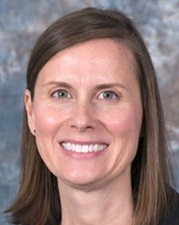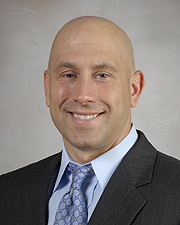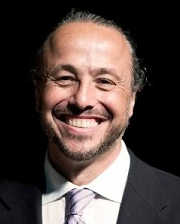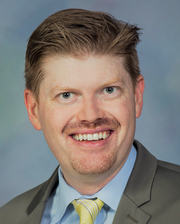-
Naqvi, I. A., Cohen, A. S., Kim, Y., Harris, J., Denny, M. C., Strobino, K., Bicher, N., Leite, R. A., Sadowsky, D., Adegboye, C., Okpala, N., Okpala, M., Savitz, S. I., Marshall, R. S., & Sharrief, A. (2023). Inequities in Telemedicine Use Among Patients With Stroke and Cerebrovascular Diseases: A Tricenter Cross-sectional Study. Neurology. Clinical practice, 13(2), e200148. https://doi.org/10.1212/CPJ.0000000000200148
-
Sharrief A. (2023). Diagnosis and Management of Cerebral Small Vessel Disease. Continuum (Minneapolis, Minn.), 29(2), 501–518. https://doi.org/10.1212/CON.0000000000001232
-
Sharrief, A. Z., Guzik, A. K., Jones, E., Okpala, M., Love, M. F., Ranasinghe, T. I. J., & Bushnell, C. (2023). Telehealth Trials to Address Health Equity in Stroke Survivors. Stroke, 54(2), 396–406. https://doi.org/10.1161/STROKEAHA.122.039566
-
Fifi, J. T., Nguyen, T. N., Song, S., Sharrief, A., Pujara, D. K., Shaker, F., Fournier, L. E., Jones, E. M., Lechtenberg, C. G., Slavin, S. J., Ifejika, N. L., Diaz, M. V., Martin-Schild, S., Schaafsma, J., Tsai, J. P., Alexandrov, A. W., Tjoumakaris, S. I., Sarraj, A., & SELECT Investigators (2023). Sex differences in endovascular thrombectomy outcomes in large vessel occlusion: a propensity-matched analysis from the SELECT study. Journal of neurointerventional surgery, 15(2), 105–112. https://doi.org/10.1136/neurintsurg-2021-018348
-
Beauchamp, J. E. S., Sharrief, A., Chaoul, A., Casameni Montiel, T., Love, M. F., Cron, S., Prossin, A., Selvaraj, S., Dishman, D., & Savitz, S. I. (2023). Feasibility of a meditation intervention for stroke survivors and informal caregivers: a randomized controlled trial. BMC psychology, 11(1), 9. https://doi.org/10.1186/s40359-022-01031-z
-
Denny, M. C., Ancer Leal, A., Montiel, T. C., Wynne, K. J., Edquilang, G., Vu, K. Y. T., Vahidy, F., Savitz, S. I., Beauchamp, J. E., & Sharrief, A. (2023). An Intervention Mapping Approach to Developing a Stroke Literacy Video for Recent Stroke Survivors: Development and Usability Study. JMIR formative research, 7, e31903. https://doi.org/10.2196/31903
-
Beauchamp, J. E. S., Villarreal, Y., Ancer Leal, A., Savitz, S. I., & Sharrief, A. (2022). Reflections on Obstacles to Stroke Awareness in Spanish-Speaking Hispanic Populations: Lost in Translation. The Journal of neuroscience nursing : journal of the American Association of Neuroscience Nurses, 54(6), 228–230. https://doi.org/10.1097/JNN.0000000000000674
-
Kim, M. S., Cleymaet, S. V., Kim, S., Andres, J., Ruchalski, C., Kim, Y., Azizi, S. A., Sharrief, A. Z., & Naqvi, I. A. (2022). Interdisciplinary patient-centred poststroke care in Follow-up After Stroke, Screening and Treatment (FASST) clinic model: a proof-of-concept pilot study. Integrated healthcare journal, 4(1), e000118. https://doi.org/10.1136/ihj-2021-000118
-
Varughese, T., Casameni Montiel T., Engebretson, J., Savitz, S. I., Sharrief, A., & Beauchamp, J. E. S. (2022). A Person-Centered Approach Understanding Stroke Survivor and Family Caregiver Emotional Health. Journal of Neuroscience Nursing: Journal of the American Association of Neuroscience Nurses, 54(2), 68-73. DOI: 10.1097/JNN.0000000000000640.
-
Love, M. F., Brooks, A. N., Cox, S. D., Okpala, M., Cooksey, G., Cohen, A. S., & Sharrief, A. Z. (2022). The effects of racism and resilience on Black stroke- survivor quality of life: Study protocol and rationale for a mixed-methods approach. Frontiers in Neurology, 13, 885374. DOI: 10.3389/fneur.2022.885374.
-
Sharma, M., Smith, E. E., Pearce, L. A., Shoamanesh, A., Perera, K. S., Coutts, S. B., Damgaard, D., Ameriso, S. F., Rha, J. H., Modrau, B., Yoon, B. W., Romano, M., Messé, S. R., Barlinn, J., Lambeck, J., Saad, F., Berkowitz, S. D., Mundl, H., Connolly, S. J., Hart, R. G., & NAVIGATE ESUS MIND MRI Substudy Investigators. (2022). Frequency and Patterns of Brain Infarction in Patients With Embolic Stroke of Undetermined Source: NAVIGATE ESUS Trial. Stroke, 53(1), 45-52. DOI: 10.1161/STROKEAHA.120.032976.
-
Fifi, J. T., Nguyen, T. N., Song, S., Sharrief, A., Pujara, D. K., Shaker, F., Fournier, L. E., Jones, E. M., Lechtenberg, C. G., Slavin, S. J., Ifejika, N. L., Diaz, M. V., Martin-Schild, S., Schaafsma, J., Tsai, J. P., Alexandrov, A. W., Tjoumakaris, S. I., Sarraj, A., & SELECT Investigators. (2022). Sex differences in endovascular thrombectomy outcomes in large vessel occlusion: a propensity-matched analysis from the SELECT study. Journal of Neurointerventional Surgery, 018348. DOI: 10.1136/neurintsurg-2021-018348.
-
Denny, M. C., Ancer Leal A., Montiel, T. C., Wynne, K., Edquilang, G., Vu, K. Y. T., Vahidy, F., Savitz, S. I., Beauchamp, J. E. S., & Sharrief, A. Z. (2022). Stroke Literacy Video for Patients and Families: Symptoms, Risk Factors, and Prevention. JMIR Formative Research. DOI: 10.2196/31903.
-
Kleindorfer, D. O., Towfighi, A., Chaturvedi, S., Cockroft, K. M., Gutierrez, J., Lombardi-Hill, D., Kamel, H., Kernan, W. N., Kittner, S. J., Leira, E. C., Lennon, O., Meschia, J. F., Nguyen, T. N., Pollak, P. M., Santangeli, P., Sharrief, A. Z., Smith, S. C. Jr., Turan, T. N., & Williams, L. S. (2021). 2021 Guideline for the Prevention of Stroke in Patients With Stroke and Transient Ischemic Attack: A Guideline From the American Heart Association/American Stroke Association. Stroke, 52(7), e364-e467. DOI: 10.1161/STR.0000000000000375.
-
Sarraj, A., Pizzo, E., Lobotesis, K., Grotta, J. C., Hassan, A. E., Abraham, M. G., Blackburn, S., Day, A. L., Dannenbaum, M. J., Hicks, W., Vora, N. A., Budzik, R. F., Sharrief, A. Z., Martin-Schild, S., Sitton, C. W., Pujara, D. K., Lansberg, M. G., Gupta, R., Albers, G. W., Kunz, W. G., & SELECT Investigators. (2021). Endovascular thrombectomy in patients with large core ischemic stroke: a cost-effectiveness analysis from the SELECT study. Journal of Neurointerventional Surgery, 13(10):875-882. DOI: 10.1136/neurintsurg-2020-016766.
-
Reddy, S., Wu, T. C., Zhang, J., Rahbar, M. H., Ankrom, C., Zha, A., Cossey, T. C., Aertker, B., Vahidy, F., Parsha, K., Jones, E., Sharrief, A., Savitz, S. I., & Jagolino-Cole, A. (2021). Lack of Racial, Ethnic, and Sex Disparities in Ischemic Stroke Care Metrics within a Tele-Stroke Network. Journal of Stroke and Cerebrovascular Diseases: The Official Journal of National Stroke Association, 30(1), 105418. DOI: 10.1016/j.jstrokecerebrovasdis.2020.105418.
-
Jones, E., Kumar, A., Lopez-Rivera, V., Sebaugh, J., Kamal, H., Sheth, S. A., Sharrief, A., & Zha, A. (2021). Racial and Ethnic Disparities in Functional Outcome after Thrombectomy: A Cohort Study of an Integrated Stroke Network. Journal of Stroke and Cerebrovascular Diseases: The Official Journal of National Stroke Association, 30(12):106131. DOI: 10.1016/j.jstrokecerebrovasdis.2021.106131.
-
Samuel, S., Reddy, S. T., Parsha, K. N., Nguyen, T., Reddy Indupuru, H. K., Sharrief, A. Z., Zhu, L., McCullough, L. D., & Savitz, S. I. (2021). Routine surveillance of pelvic and lower extremity deep vein thrombosis in stroke patients with patent foramen ovale. Journal of thrombosis and thrombolysis, 51(4), 1150-1156. DOI: 10.1007/s11239-020-02262-w. PMID: 32888135.
- Kim, Y., Sharrief, A., Kwak, M. J., Khose, S., Abdelkhaleq, R., Salazar-Marioni, S., Zhang, G.-Q., & Sheth, S. A. (2022). Underutilization of Endovascular Therapy in Black Patients With Ischemic Stroke: An Analysis of State and Nationwide Cohorts. Stroke, STROKEAHA121035714. https://doi.org/10.1161/STROKEAHA.121.035714
- Noser, E. A., Zhang, J., Rahbar, M. H., Sharrief, A. Z., Barreto, A. D., Shaw, S., Grotta, J. C., Savitz, S. I., & Ifejika, N. L. (2021). Leveraging Multimedia Patient Engagement to Address Minority Cerebrovascular Health Needs: Prospective Observational Study. Journal of Medical Internet Research, 23(8), e28748. https://doi.org/10.2196/28748
- Sheth, S. A., Wu, T.-C., Sharrief, A., Ankrom, C., Grotta, J. C., Fisher, M., & Savitz, S. I. (2020). Early Lessons From World War COVID Reinventing Our Stroke Systems of Care. Stroke, 51(7), 2268–2272. https://doi.org/10.1161/STROKEAHA.120.030154
- Skolarus, L. E., Sharrief, A., Gardener, H., Jenkins, C., & Boden-Albala, B. (2020). Considerations in Addressing Social Determinants of Health to Reduce Racial/Ethnic Disparities in Stroke Outcomes in the United States. Stroke, 51(11), 3433–3439. https://doi.org/10.1161/STROKEAHA.120.030426








